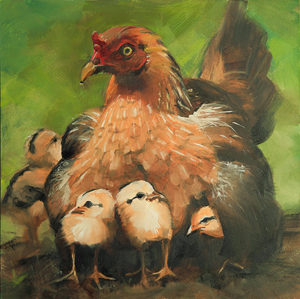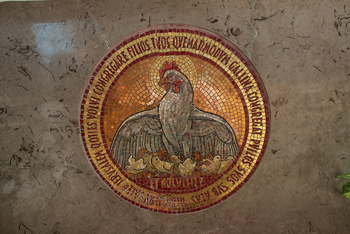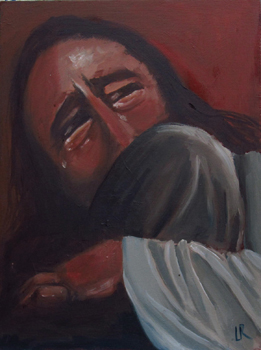For Sunday March 17, 2019
Lectionary Readings (Revised Common Lectionary, Year C)
Genesis 15:1-12, 17-18
Psalm 27
Phillipians 3:17-4:1
Luke 13:31-35
If I asked you to draw a picture of Jesus, what would you draw? A blue-eyed shepherd holding a staff? A lion? (As in, Aslan of Narnia, or the Lion of the Tribe of Judah?) A loaf of bread and a cup of wine? A door, a gate, a light, a bridegroom? What about a chicken? Would it occur to you to draw a chicken?
Growing up, I spent many summers in rural South India, visiting my grandparents. Both of my grandmothers kept hens — whole flocks of the clucking, flapping things — and as a little girl raised in American suburbia, I found the birds hilarious. After all, they weren’t exactly the most elegant of creatures. They were squat and beady-eyed, nosy and boisterous. They couldn’t fly to save their lives, and they made the funniest noises. Granted, they could be fierce when they wanted to be; I learned early on to keep my distance from their beaks. But there was something sad about their ferocity, too. Something defenseless. Something vulnerable.
To answer my own question: if I had to draw a picture of Jesus, no, I would definitely not draw a chicken. So I come to the lectionary reading from Luke’s gospel this week, and stumble at Jesus’s self-description: “Jerusalem, Jerusalem, the city that kills the prophets and stones those who are sent to it! How often have I desired to gather your children together as a hen gathers her brood under her wings, but you were not willing.”
Can you picture it? Jesus, the mother hen?
Here’s the thing. If maternal power, acumen, or success were the characteristics Jesus wanted to emphasize in his choice of metaphor, he could have used any number of more-appropriate Old Testament images to make his point. God as enraged she-bear (Hosea 13:8). God as soaring mother eagle (Deuteronomy 32:11-12). God as laboring woman (Isaiah 42:14). God as mom of a healthy, happy toddler (Psalm 131:2). God as skilled midwife (Psalm 22:9-10). But those are not the images he chooses. Instead, on this second Sunday in Lent, Luke’s gospel invites us to contemplate Jesus as a mother hen whose chicks don’t want her. Though she stands with her wings wide open, offering welcome, belonging, and shelter, her children will not come home to her. Her wings — her arms — are empty. This, in other words, is a mother bereft. A mother in mourning. A mother struggling with failure and futility.
 |
In the verses that precede this heartbreaking description, a group of Pharisees warn Jesus to leave the area where he’s teaching and healing, because Herod wants to kill him. Though Jesus knows full well that the tetrarch’s displeasure is nothing to mess with (Herod is, after all, the villain who ordered John the Baptist’s arrest and beheading), he tells the Pharisees that he’s not afraid of “that fox.” I have work left to do, he tells them, and I won’t be deterred by the machinations of a bully. At this point in the story, Jesus has set his course for Jerusalem, the city that rejects God’s messengers and kills its prophets. Jesus knows exactly what fate awaits him there, but he won’t change course. Not for Herod, not for anyone.
And yet, even as he stands up to a fox, Jesus is a mother keening in grief. What does this stunning image offer to us for our own Lenten journeys? Here are three things that strike me as I imagine a Mother Hen God:
During Lent, we are called to embrace radical vulnerability. Yes, Jesus mocks Herod by calling him a fox. But he never argues that the fox isn’t dangerous. He never promises us divine immunity from harm. I mean, let’s face it — if a determined fox wants to kill a brood of downy chicks, he will find a way to do so. What Jesus the mother hen offers is not the absence of danger, but the fullness of his unguarded, open-hearted, wholly vulnerable self in the face of all that threatens and scares us. What he gives us is his own body, his own life. Wings spread open, heart exposed, shade and warmth and shelter at the ready. What he promises — at great risk to himself — is the making of his very being into a place of refuge and return for his children. For all of his children — even the ones who want to stone and kill him.
What would it take for us to embrace Jesus’s vulnerability as our strength? To trade in our images of a conquering God for the mother hen God of this lectionary passage? Maybe what we need most this Lent is not a fox-like divinity who wields his power with sly intelligence and sharp teeth, but a mother hen who calls to us with longing and desperation, her wings held patiently and bravely open. A mother hen who plants herself in the hot center of her children’s terror, and offers refuge there. There at ground zero, where the feathers fly and the blood is shed.
 |
I’ve seen mother hens gather their chicks under their wings when a predator approaches. The way they swell with indignation, fear, and courage. The way they stand their ground. The way they prepare to die if they have to, their children tucked securely beneath their soft, vulnerable bodies. I can’t imagine a more profound or radical picture of our God. Can you?
During Lent, we are called to lamentation. You don’t have to be a parent to mourn missed opportunities, broken promises, or crushed hopes. All of us — regardless of our circumstances — know what it’s like to feel rejected. We know the pain of watching someone we care about slowly self-destruct before our eyes. We carry painful memories of unrequited love, unmet desire, and unfulfilled dreams.
In our Gospel passage, Jesus grieves for his lost and wandering children. For the little ones who will not come home. For the city that will not welcome its saviour. For the endangered multitudes who refuse to recognize the peril that awaits them. His is the lamentation of long, thwarted, and helpless yearning — “How often have I desired to gather you.” It is a lamentation for all that could have been in this broken, resistant, clueless world. It is a lamentation for the real limits we live with as human beings. The lasting wounds. Sometimes, like Jesus the mother hen, we can’t do what we most desire to do. We can’t give what we deeply long to give. We can’t save the loved ones we ache to save.
So. How might you be called to lamentation during this holy season? What do you yearn for that eludes you? What missed chances, failed efforts, or broken dreams tug at your heart and call you into mourning? How might we, the Church, lament with Jesus over our homes, our cities, our countries, our planet? How might we stand with him in the Jerusalems of our lives, and weep our sorrow into new hope?
 |
And finally, during Lent, we are called to return. “You were not willing,” Jesus tells his wandering children. You would not come back. You would not relinquish your right to yourself — not even when your life depended on it. The image of chicks snuggling under a mother hen’s wings is an image of gathering, of community, of intentional oneness. It requires a return. A surrender. A tempering of our wild lone-rangerism. What in us is “not willing” to be gathered this Lent? Not willing to surrender to community? To a larger whole? To the wings of God’s care and God’s people? Where in our lives have we chosen to go it alone, spurning love because love is too risky? I won’t lie; loving a vulnerable mother hen God is the riskiest thing some of us can imagine doing. We’d prefer the lion, perhaps. Or the infuriated bear. And yet a yearning mother hen is the mother we belong to. She’s the one weeping for us. She’s the one calling us home. Her body and her heart are on the line, and yet her desire is fixed on us. She will never, ever stop calling us home.
How often have I desired to gather you. During this wilderness season of repentance and transformation, may the desire of Jesus become our desire, too. May the way of the mother hen — the way of vulnerability, sorrow, hope, and eternal welcome — lead us home.
Notes on Art:
- Beth Bathe is an award-winning artist in Lancaster, PA.Learn more about her work at: http://bethbathe.com
- Mother Hen. Mosaic in the Church of Dominus Flevit, Jerusalem
- Jesus Weeps by Linda Richardson (see lindarichardson.net)
Image credits: (1) Blogspot.com; (2) Patheos.com; and (3) Wordpress.com.





